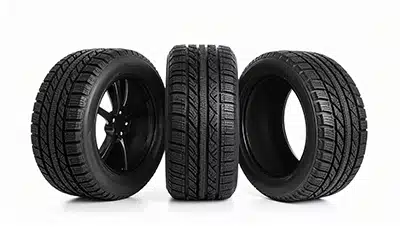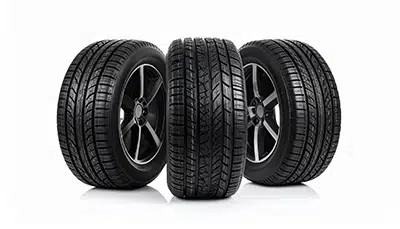Understanding All-Terrain Tire Technology
All-terrain tires represent the perfect compromise for drivers who demand off-road capability without sacrificing on-road comfort and performance. At Custom Wheels N Tires, we understand that many truck, SUV, and 4x4 owners need tires that can confidently tackle weekend adventures while still providing a civilized driving experience during the daily commute.
Modern all-terrain tires have evolved dramatically, incorporating advanced technologies that deliver impressive off-road traction alongside surprisingly refined highway manners. Let's explore what makes all-terrain tires the ideal choice for versatile vehicles and how to select the perfect set for your specific needs and driving habits.
The All-Terrain Advantage
Versatile Performance Across Multiple Surfaces
All-terrain tires are engineered to perform competently across a diverse range of surfaces, making them the ultimate "do-everything" option for adventurous drivers. Their versatility stems from several key design elements:
- Specialized tread patterns with aggressive shoulder blocks for off-road traction
- Interlocking center tread elements providing on-road stability and handling
- Variable-depth siping that enhances wet grip while maintaining tread block stability
- Strategically placed stone ejectors preventing rock retention and damage
- Reinforced sidewalls offering puncture resistance on rough terrain
This versatility allows you to confidently navigate dirt trails, gravel roads, moderate mud, and even light snow without changing tires—while still enjoying reasonable comfort, quietness, and fuel economy during highway driving.
Balanced On-Road Manners
Unlike more aggressive off-road focused tires, quality all-terrain options maintain civilized road manners that make them practical for everyday use:
- Optimized tread block arrangements that minimize road noise and vibration
- Specially formulated rubber compounds balancing grip with rolling resistance
- Computer-designed tread patterns reducing harmonic noise generation
- Enhanced shoulder stability for predictable cornering and handling
- Rain groove technology improving wet weather performance and hydroplaning resistance
These refinements make all-terrain tires particularly well-suited for dual-purpose vehicles that see significant highway miles between off-road excursions, offering a driving experience far more comfortable than dedicated mud-terrain or extreme off-road tires.
Durability and Longevity
All-terrain tires are built to withstand harsh conditions while still delivering reasonable tread life:
- Cut and chip resistant rubber compounds designed for rough surfaces
- Reinforced construction with additional plies or steel belts
- Robust sidewall protection against trail hazards and impacts
- Deeper initial tread depth providing extended service life
- Tread designs engineered to wear evenly despite mixed-use conditions
While tread life varies significantly between brands and specific models, many premium all-terrain tires now offer 50,000+ mile treadwear warranties, providing excellent value for vehicles that see both on and off-road use.
All-Terrain Tire Categories
Highway-Biased All-Terrain
Highway-biased all-terrain tires prioritize on-road refinement while maintaining adequate off-road capability for occasional adventures. These tires are ideal for SUV and truck owners who spend 80-90% of their driving time on paved surfaces but still need competent performance for weekend excursions.
Key characteristics include:
- More moderate tread patterns with less aggressive shoulder blocks
- Quieter operation with reduced road noise and vibration
- Enhanced fuel efficiency through optimized rolling resistance
- Excellent wet pavement performance and hydroplaning resistance
- Longer tread life, typically 60,000+ miles under normal conditions
Popular models include the Michelin LTX A/T2, Bridgestone Dueler A/T Revo 3, and Continental TerrainContact A/T, all of which deliver excellent on-road manners with capable light off-road performance.
Balanced All-Terrain
Balanced all-terrain tires represent the heart of the category, offering a true 50/50 compromise between off-road capability and on-road refinement. These tires suit drivers who regularly encounter both environments and need consistent performance across varied conditions.
Distinguishing features include:
- Moderately aggressive tread patterns with substantial shoulder lugs
- Good off-road traction in dirt, gravel, and light-to-moderate mud
- Acceptable road noise levels suitable for daily driving
- Three-Peak Mountain Snowflake (3PMSF) rating on many models for enhanced winter capability
- Typical tread life of 45,000-60,000 miles depending on driving conditions

Excellent examples include the BFGoodrich All-Terrain T/A KO2, Falken Wildpeak A/T3W, and Goodyear Wrangler All-Terrain Adventure, which have established themselves as benchmarks in the all-terrain category.
Off-Road Focused All-Terrain
For enthusiasts who prioritize trail capability while still needing reasonable on-road performance, off-road focused all-terrain tires deliver enhanced traction in challenging conditions without the extreme compromises of dedicated mud tires.
Notable characteristics include:
- More aggressive tread patterns with deep, open shoulder designs
- Enhanced sidewall protection and puncture resistance
- Superior performance in mud, sand, and rocky terrain
- Acceptable but noticeably louder highway operation
- Typically shorter tread life, usually in the 40,000-50,000 mile range
Leading options in this category include the Toyo Open Country A/T III, Nitto Ridge Grappler, and Cooper Discoverer AT3 XLT, which bring near-mud-terrain capability with more civilized road manners.
All-Weather All-Terrain
A growing segment within the all-terrain category, all-weather all-terrain tires add enhanced winter performance to the versatile all-terrain formula, making them ideal for regions with significant seasonal variation.
Specialized features include:
- Three-Peak Mountain Snowflake (3PMSF) certification for winter performance
- Specialized siping patterns that provide additional biting edges in snow and ice
- Compounds formulated to remain flexible in cold temperatures
- Tread designs optimized for slush evacuation and snow traction
- Year-round capability eliminating the need for seasonal tire changes
Popular selections include the Yokohama Geolandar A/T G015, General Grabber ATX, and Firestone Destination A/T2, all engineered specifically for all-season performance including winter conditions.
Selecting the Right All-Terrain Tires
Usage Profile Assessment
The most important factor in choosing the right all-terrain tire is honestly assessing your typical driving patterns:
- 90% on-road / 10% off-road: Highway-biased all-terrains provide the best balance
- 70% on-road / 30% off-road: Balanced all-terrains offer ideal versatility
- 50% on-road / 50% off-road: Off-road focused all-terrains deliver necessary capability
- Variable conditions with winter driving: All-weather all-terrains provide year-round performance
Be realistic about your actual needs rather than aspirational off-road adventures—many drivers are better served by highway-biased all-terrains that excel during the 90% of driving that occurs on paved roads.
Vehicle Considerations
Your specific vehicle influences which all-terrain tires will perform best:
- Heavy-duty trucks: Need load-rated (E or F) tires with robust construction
- Mid-size trucks: Often perform best with P-metric or lighter LT options
- Crossover SUVs: Typically require highway-biased all-terrains with appropriate load ratings
- Modified vehicles: May need specific sizes to accommodate lift kits or larger wheel packages
Our tire experts can help ensure your all terrain tires selection properly matches your vehicle's weight, intended use, and any modifications you've made.
Size and Specification Considerations
All-terrain tires come in various configurations that affect both performance and compatibility:

- P-Metric vs. LT-Rated: LT tires offer greater durability but often provide a firmer ride
- Load Range: Higher load ranges (C, D, E, F) provide increased carrying capacity but may impact ride comfort
- Original vs. Upsized: Maintaining close to original overall diameter preserves accuracy of vehicle systems
- Aspect Ratio: Lower profile tires improve on-road handling but may reduce off-road performance
These specifications should be carefully considered alongside your performance priorities to find the ideal balance for your specific vehicle and driving needs.
Key Takeaways: All-Terrain Tires
- All-terrain tires provide versatile performance across multiple surfaces from highways to moderate off-road conditions
- Modern all-terrains balance off-road capability with surprisingly refined on-road manners
- Specialized construction delivers enhanced durability and puncture resistance for challenging environments
- Highway-biased all-terrains prioritize comfort and fuel efficiency for primarily on-road driving
- Balanced all-terrains offer true 50/50 performance for drivers who regularly encounter varied conditions
- Off-road focused all-terrains provide enhanced trail capability while maintaining acceptable highway manners
- All-weather all-terrains add winter performance to the versatile all-terrain formula
- Honestly assessing your typical usage pattern is critical for selecting the right all-terrain tire
- Vehicle type and specifications significantly influence which all-terrain tire will perform best
Frequently Asked Questions
Do all-terrain tires affect fuel economy?
Yes, all-terrain tires typically reduce fuel economy by 0.5-2 mpg compared to highway tires due to increased rolling resistance from their more aggressive tread patterns and heavier construction. Highway-biased all-terrains minimize this impact, while off-road focused variants tend to have a more significant effect. The weight increase from switching to LT-rated tires also contributes to reduced efficiency. However, manufacturers have made substantial improvements in recent years, with modern all-terrains offering better fuel economy than their predecessors through advanced rubber compounds and optimized tread designs that balance off-road capability with reasonable rolling resistance.
How noisy are all-terrain tires for daily driving?
Modern all-terrain tires vary considerably in noise levels, with highway-biased models approaching the quietness of standard highway tires, while off-road focused variants produce noticeably more road noise. Premium all-terrains incorporate sophisticated noise-reduction technologies such as variable pitch tread patterns, optimized tread block sequencing, and sound-absorbing features that significantly reduce highway drone. Most drivers find the noise levels of quality all-terrains to be entirely acceptable for daily use, with highway-biased models being particularly well-mannered. Brand-specific technologies like Nitto's "Quiet Technology" or Michelin's "Comfort Control Technology" have substantially improved the highway refinement of today's all-terrain offerings.
What's the difference between all-terrain and mud-terrain tires?
All-terrain and mud-terrain tires differ primarily in their performance balance and specialized capabilities. All-terrain tires feature moderately aggressive tread patterns designed to perform well across varied surfaces while maintaining acceptable on-road manners. In contrast, mud-terrain tires feature much more aggressive tread patterns with larger, deeper lugs, wider void areas, and reinforced sidewalls specifically optimized for extreme off-road conditions. Mud-terrains excel in deep mud, loose sand, and technical rock crawling but compromise significantly on highway comfort, noise levels, fuel economy, and wet pavement traction. For vehicles that spend substantial time on paved roads, all-terrains typically offer a much better overall experience.
Are all-terrain tires good in snow and winter conditions?
Many modern all-terrain tires perform admirably in snow, with some models earning the Three-Peak Mountain Snowflake (3PMSF) certification indicating enhanced winter capability. Their aggressive tread patterns, siping designs, and relatively soft compounds provide good snow traction, particularly in deeper snow where the open tread pattern helps maintain forward momentum. However, their performance on ice and in extreme winter conditions doesn't match dedicated winter tires. All-terrain tires with the 3PMSF rating, such as the Falken Wildpeak A/T3W, BFGoodrich All-Terrain T/A KO2, and General Grabber ATX, offer the best winter performance in the category and provide a viable year-round option for regions with moderate winter conditions.
Should I choose P-metric or LT-rated all-terrain tires?
The choice between P-metric and LT-rated all-terrain tires depends on your vehicle and usage requirements. P-metric all-terrains typically offer a more comfortable ride, better fuel economy, and lower cost, making them suitable for lighter SUVs, crossovers, and trucks used primarily on-road with light off-road duty. LT (Light Truck) rated tires feature reinforced construction with stronger sidewalls, additional plies, and higher load capacities, making them ideal for heavier vehicles, towing applications, and more demanding off-road use. If you frequently carry heavy loads, tow trailers, or tackle challenging terrain, LT tires provide necessary durability despite their firmer ride quality and higher price point.
At Custom Wheels N Tires, our specialists understand the unique requirements of versatile vehicles that navigate both highways and trails. Whether you're building a comfortable daily driver with weekend adventure capability or a more trail-focused rig that still needs reasonable road manners, we can help you navigate the all-terrain tire market to find the perfect balance of capabilities for your specific vehicle and driving habits.